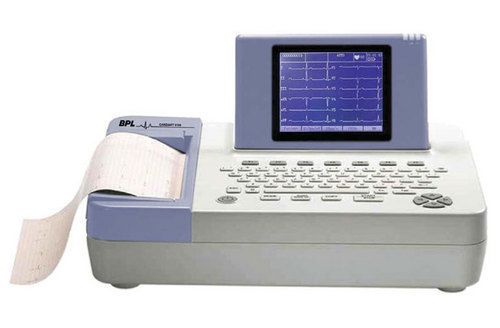- Emergency Number
- +91-97832-25511
- 01509 225511

The electrocardiogram, also referred to as ECG, 12-lead ECG, or EKG, is a non-invasive diagnostic test that evaluates your heart's electrical system to assess for heart disease. It uses flat metal electrodes placed on your chest to detect the electrical charges generated by your heart as it beats, which are then graphed. Your doctor can analyze the patterns to get a better understanding of your heart rate and heart rhythm, identify some types of structural heart disease, and evaluate cardiac efficiency.
what to expect during an electrocardiogram
Illustration by Cindy Chung, Verywell
Purpose of Test
An ECG detects your heart's electrical rhythm and produces what's known as a tracing, which looks like squiggly lines. This tracing consists of representations of several waves that recur with each heartbeat, about 60 to 100 times per minute. The wave pattern should have a consistent shape. If your waves are not consistent, or if they do not appear as standard waves, this is indicative of heart disease.
There are a variety of characteristic changes that occur with different heart concerns, and your doctor can look at your ECG wave patterns to see if they are suggestive of certain types of heart disease.
Many doctors order an ECG as part of a yearly medical examination to screen for heart disease. This may apply to you if:
You have had heart disease in the past
You have a medical condition that predisposes you to heart disease, such as hypertension, diabetes, high cholesterol, or inflammatory disease
You have other significant risk factors for cardiac disease
An ECG may also be recommended if you have signs or symptoms of heart disease, such as chest pain, shortness of breath, lightheadedness, dizziness, or fainting spells. Likewise, if you have signs of a TIA or stroke, such as vision changes, numbness, weakness, or communication problems, you are also likely to need an ECG because some types of heart disease can cause a stroke.
If you have heart disease, you may need periodic ECG testing to evaluate whether your disease is worsening and to monitor the treatment effects of your heart medications.
An ECG is also required prior to any type of heart surgery, including surgery for pacemaker placement. A pre-operative screening ECG is required prior to any surgical procedure that involves general anesthesia because heart disease increases the risk of adverse events from general anesthesia and because this helps your anesthesiologists as they plan your anesthetic medications and surgical monitoring.